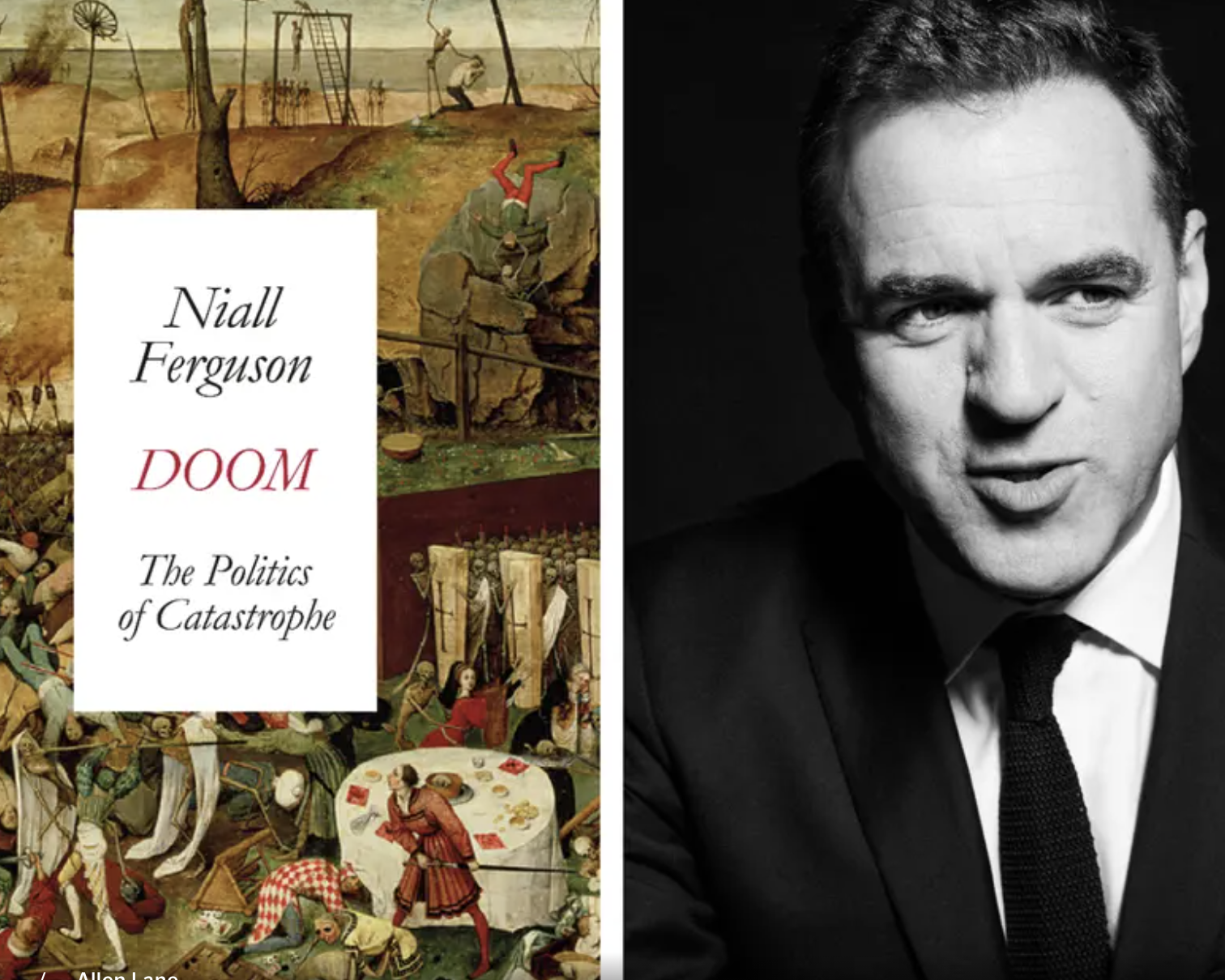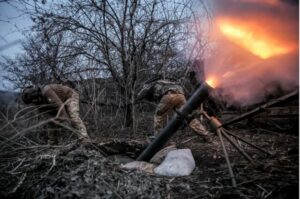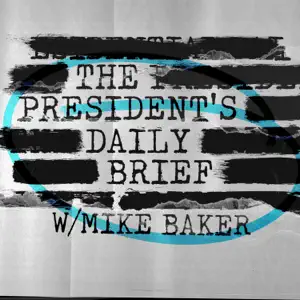
Doom: The Politics of Catastrophe by Niall Ferguson review
(Evening Standard) – From plagues and volcanic eruptions to the current Covid pandemic, mankind has always been faced with catastrophes.
Thought Leader: Niall Ferguson

Ukrainian soldiers in the Donetsk region fire toward Russian army positions on March 16. (Oleg Petrasiuk/Ukraine’s 24th Mechanized Brigade/AP)
President Donald Trump’s peacemaking in the war in Ukraine risks collapsing into a surrender. He correctly intuited that President Joe Biden lacked a plan, but Trump’s alternative has been to mediate, not negotiate, while weakening Ukraine’s leverage.
Vladimir Putin pretends to play along, but the Russian strongman will always add more demands. He does not want to acknowledge a sovereign, independent, democratic Ukraine. Putin’s war is about much more than territory; he is fighting for Russian history and his place in it. President Volodymyr Zelensky of Ukraine understands that Putin will seek to subvert any so-called settlement. Zelensky has therefore pressed Trump for security guarantees.
Trump will refuse any such assurances. Biden would not have provided them, either — the harsh reality is that the United States will not fight Moscow for Kyiv. And Trump’s minerals deal is no substitute. At best, it has involved the two sides initialing a weak memorandum of understanding to encourage investment.
But there is an alternative to a guarantee: The United States could strengthen Ukraine’s ability to defend itself and therefore to negotiate from a stronger position. Trump does not need to commit the U.S. military. He needs to combine economic means and military supplies.
The United States, the European Union, Britain, Canada, Australia and other friends of Ukraine should transfer over $300 billion of frozen Russian assets to a special fund set up for Ukraine. This sum would sustain Ukraine’s economy and military for years without costing Americans a dime.
The international law of countermeasures clearly justifies this transfer. My colleague Philip Zelikow co-wrote a memorandum signed by 11 leading international lawyers — including a French former president of the European Society of International Law and prominent German, British, Belgian, Dutch, Japanese and other authorities — that explains the justification in detail.
In a similar situation, the United States, Britain and France transferred Iraqi assets to a trust fund to compensate Kuwait and others after the 1991 Persian Gulf War. The Repo Act, signed into law last year, authorized and encouraged the transfer of Russian assets and has bipartisan support.
Some Europeans fear that a transfer of assets will undermine the euro. But as former treasury secretary Lawrence H. Summers, Zelikow and I have argued, the Group of Seven countries’ position is strong if they act together.
The freezing of Russian assets for the past three years did not harm the euro or the dollar. Countries hold reserves for reasons of macroeconomic stability, not so they can invade their neighbors — so the Europeans have nothing to worry about. And if the European Central Bank fears Saudi or Chinese threats to sell French bonds in retaliation, it could resist that blackmail by purchasing those bonds.
It is shameful to permit Europe’s currency to become an excuse for geopolitical timidity. Indeed, the world will be safer if countries worry that moves to conquer neighbors will lead to the loss of their official assets in G-7 currencies.
The Biden administration deferred to European qualms, accepting instead a ramshackle arrangement that took only the interest paid on Russian assets. The European legal logic of using the interest but not the principal suggests the weakness of its position.
The Biden team also hesitated because most of the Russian assets are in the Euroclear, a central securities depository in Belgium. But many of those assets are held in dollar securities and therefore are subject to U.S. supervisory authority, giving Treasury Secretary Scott Bessent leverage to push the Europeans.
Once Ukraine receives Russia’s funds, the United States can provide Kyiv with arms and intelligence without a security guarantee. If Putin wants to waste the lives of Russians and North Koreans against Ukraine’s defenses, let him do so. Russia’s war economy is running short of labor and grinding down; last year, its central bank’s contortions, including soaring interest rates, sparked a fight with Russia’s military-industrial complex. This is absolutely the wrong time to grant Putin relief.
Trump’s emissaries began by stating what they would not do for Ukraine; then they threatened Kyiv. This is a bizarre way to meditate, much less negotiate. Trump should know that he needs leverage with Putin, unless his purpose is really to put a diplomatic veneer on Ukraine’s capitulation. Trump should make one of his fast turns toward a new, more powerful position.
Trump says he wants to be a peacemaker. The historian Tacitus wrote that Rome’s foes understood that its legions “make a desert and call it peace.” The United States should not concede to a Russian peace of Ukraine’s destruction and submission.
Robert Zoellick’s expertise in global economics, diplomacy, and international security makes him a compelling keynote speaker for today’s most pressing geopolitical challenges. As a former World Bank president and U.S. trade representative, he offers unmatched insights into economic leverage, international negotiations, and strategic policymaking. His ability to break down complex global conflicts—like the war in Ukraine—and propose actionable solutions ensures his keynotes are both thought-provoking and highly relevant.
Zoellick’s speaking engagements are managed exclusively by WWSG. To host him as your next keynote speaker, contact us.
Doom: The Politics of Catastrophe by Niall Ferguson review
(Evening Standard) – From plagues and volcanic eruptions to the current Covid pandemic, mankind has always been faced with catastrophes.
Thought Leader: Niall Ferguson
Michael Baker: Ukraine’s Faltering Front, Polish Sabotage Foiled, & Trump vs. Kamala
In this episode of The President’s Daily Brief with Mike Baker: We examine Russia’s ongoing push in eastern Ukraine. While Ukrainian forces continue their offensive…
Thought Leader: Mike Baker
Peter Zeihan: What Does the Future Hold for Taiwan and Semiconductors?
From Peter Zeihan: Taiwan has positioned itself as the dominant player in the semiconductor industry, but what would happen if a conflict with China broke…
Thought Leader: Peter Zeihan

